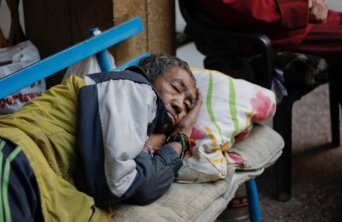- About
- Topics
- Picks
- Audio
- Story
- In-Depth
- Opinion
- News
- Donate
-
Signup for our newsletterOur Editors' Best Picks.Send
Read, Debate: Engage.
| topic: | Political violence |
|---|---|
| located: | India |
| editor: | Sanjana Chawla |
In preparation for the G20 Summit 2023 in New Delhi, India's capital, a significant number of homes have been demolished, leaving thousands of people homeless. This widespread displacement has occurred throughout the country for various reasons, including alleged encroachment, city beautification initiatives, infrastructure projects, environmental conservation efforts, forest protection measures, religious targeting, and clearance operations in border states.
Since January 2023, more than 1,600 homes have been demolished and over 3,000 eviction notices have been served in Delhi alone, impacting nearly 25,000 lives. The government has been targeting slums, mostly ones in the vicinity of railway tracks, water bodies, drains and forest areas, aiming to demolish and evict these settlements from their lands. In some cases, residents have received eviction notices with extremely short notice periods, sometimes as little as a day or even mere hours before the demolitions take place.
The Public Works Department (PWD), the Archaeological Survey of India (ASI) and the National Disaster Relief Force (NDRF) along with the Delhi Police (the law enforcement agency for the National Capital Territory of Delhi) have carried out the demolitions in Delhi’s Mehrauli, Tughlakabad, Jahangirpuri, Kasturba Nagar, Sarojini Nagar, Vishwas Nagar, Vasant Vihar, Chhatarpur, Pragati Maidan, Gyaspur, Yamuna Khadar, Shaheen Bagh, Dwarka, Dhaula Kuan, Badarpur and Kharak Riwara neighbourhoods, amongst others.
Despite the refusal of authorities to halt or postpone the demolitions, they have proposed an alternative to the residents of the slums. They have suggested the option of relocating to temporary night shelters operated by the Delhi Urban Slum Improvement Board (DUSIB). However, it is important to note that these shelters are plagued by issues such as overcrowding, unhygienic conditions, and a lack of safety measures
The response and actions of India's Central Government (Bharatiya Janata Party - BJP) and Delhi's State Government (Aam Aadmi Party - AAP) regarding the issue of displaced people have been unclear and unhelpful. Despite both political parties making promises during their election campaigns to provide tangible and permanent housing solutions for slum dwellers, these commitments have yet to be fulfilled.
And while the primary responsibility for directing the demolition and clearance operations lies with the central government, the AAP government has been criticised as well for not adequately addressing the issue of rehabilitation for slum residents. Despite the central government's involvement in directing the agencies involved in the demolitions, the AAP government has been accused of not taking sufficient action to protect the rights of the affected slum residents and provide them with appropriate rehabilitation measures.
Ideally, it would be expected that both the government and the Delhi Urban Slum Improvement Board (DUSIB) work together to ensure the rehabilitation of all displaced individuals. However, the DUSIB has refused to take the necessary steps to fulfill this responsibility.
Since the government bodies have faltered, non-governmental organisations (NGOs) have stepped in to ensure justice for the deprived.
Action Aid, an international NGO fighting for rehabilitation, has called for a complete pause on such eviction initiatives. Meanwhile, Mazdoor Awas Sangharsh Samiti, a local organisation working to help people who lost their housing, has submitted a memorandum to the Prime Minister’s Office demanding immediate rehabilitation.
In response to the situation, activists are also advocating for the allocation of vacant homes built under the Rajeev Ratan Awas Yojana to the displaced individuals. They argue that this would be a practical solution to address the housing needs of the affected population.
Additionally, NGOs are demanding the implementation of a policy that ensures immediate and dignified rehabilitation for the displaced individuals. This includes providing guaranteed rent until proper rehabilitation is achieved, ensuring continuous access to water and electricity, and calling for a complete halt on the demolition of slums and houses.
Image by Shivam Dewan.
